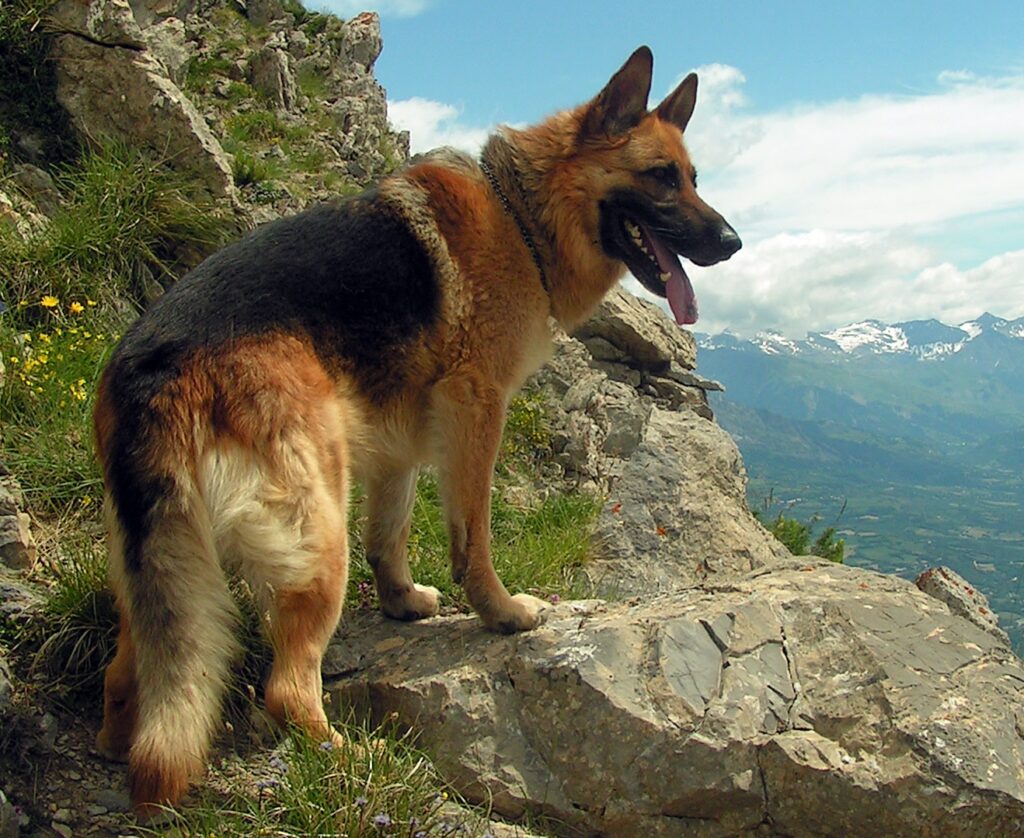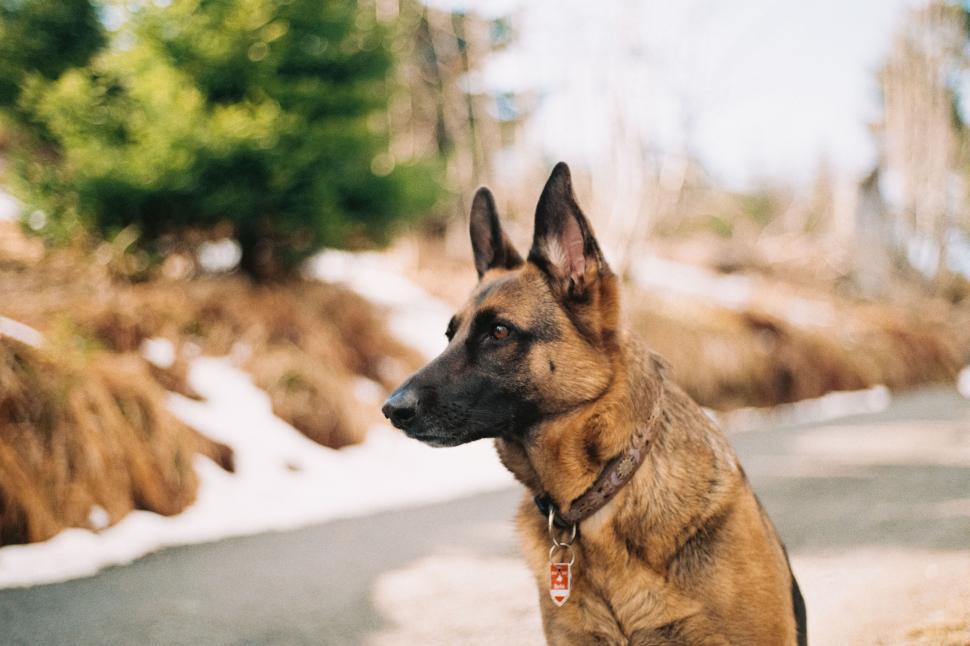
German Shepherds are among the most popularly bred dogs globally. Their typical attributes, such as smarts and loyalty, can be used in any working status, from police work to search-and-rescue missions.
Although physical and mental strength build almost an irresistible belief that they can tolerate any environment, perhaps the most debated topic with dog owners is whether or not a german shepherd should be kept outside. In this article, we shall explore several aspects of this topic: weather tolerance, ideal environments, and german shepherd care tips for outdoor living. German Shephard are excellent guard dog.
Can I Leave My German Shepherd Outside All Day?
Knowing their needs before deciding if you can leave your German Shepherd outside all day: German Shepherds are active, clever dogs that need mental stimulation and exercise to be happy and healthy. Now, although they can tolerate being outdoors for the greater part of the day, here is a list of consideration factors
1. Mental Stimulation– German Shepherd dogs have a high capacity for the brain, thus without mental stimulation, they can easily become bored, anxious, and pretty destructive.
Therefore, they will require toys, puzzles, or an interactive environment in order to prevent behavior problems. Without such mental stimulation, they may start digging or barking too loudly and try to escape.
2. Social Interaction: German Shepherds are very loyal and attached to their family. They usually develop separation anxiety if kept out of their owners’ view for long times, especially when kept outdoors.
In such places, they do face time out, and isolation is bound to severely affect them because they live on social interaction as well as companionship.
3. Protection from Elements: Although German Shepherds do have a double coat to keep off extreme weather conditions to some extent, having them outside all day exposes them to elements like rains, snowfalls, or extreme temperatures, which may not be suitable for their health.
The proper shelter, shaded areas, as well as clean drinking water are essentials if your German Shepherd is going to spend much of its time outside.
4. Exercise Needs: German Shepherds are energetic dogs, and they need constant exercising. Without any chance to run, play around, or engage in exploring, they might become cranky or ill if locked outside their days. Playtime, walking, and trainings form a part of how to care for a German Shepherd that fulfills the physical needs of your dog.
In order to have a better understanding check out Are German Shepherds good as Guard Dogs?
Can a German Shepherd Stay Outside in Winter?
They are a double-coated breed that helps to keep the animal warm, insulating them when the temperature becomes too cold. This does not imply that their fur will prevent exposure to extreme temperatures for a long period. Some factors:
1. Temperate Tolerance: German Shepherds tolerate cold temperatures much better than many breeds, but on very cold days you should be watchful, because of the extreme cold can quickly become dangerous.
Exposure to freezing weather for a much longer duration may result in hypothermia or frost-biting especially below 20°F (-6°C). And if you decide to keep your dog outdoors in winter, you must make sure that it is adequately insulated with proper warm shelter.
2. Shelter Needs: An outdoor German Shepherd should have a dog house that is strong, insulated, and has warm bedding during winter. That must be big enough for the dog to be able to exercise but not big enough to lose heat. Check also for dampness in the bedding as it might lower their body temperature considerably.
3. Hydration and Nutrition: As in other warm seasons, your dog must be provided with adequate supplies of water. This might seem difficult in freezing temperatures. Their water bowl needs to be kept unfrozen, and their ration needs to be increased because they will burn some of their calories to stay warm.
4. Symptoms of Hypothermia: The symptoms of hypothermia-including shivering, lethargy, weakness and labored breathing-should be included in the dog care tips for winter especially for a german shepherd. If ever you feel such symptoms, you must bring your dog inside instantly and take him to the vet for urgent treatment, if needed.
While some German Shepherds can tolerate the winter outdoor, they should be watched closely for any behavioral and health changes.
It would always be advisable to bring them indoors at the coldest part of the night, and giving them copious exercise and stimulation indoors are part of the ways to care for a German Shepherd in winter.
Can a German Shepherd Survive in India?
Indian Climate
Indian climate is characteristic and distinguished by extreme heat, along with high humidity. This climate varies from the cooler environments that usually greet a German Shepherd. So, can German Shepherds survive in India? Yes, but with some important precautions.
1. Heat Tolerance: German Shepherds are better suited for moderate to cold climates, but proper care can make them function in warmer climates like India, although they are more likely to be prone to heatstroke in warm environments during peak summer seasons.
2. Provide Shade and Water: If your German Shepherd is outdoors, provide it with cooling, shaded areas. Hydration is crucial because the dog can quickly dehydrate during hot weather; a cooling mat, fans, or an air-conditioned area can be welcomed relief.
3. Avoid Outdoor Exercises: For most, the best time to avoid overheating is not exercising outside. Rather than going to the field or park during the peak hot hours of the day, it is best to exercise during the early morning and in the evening.
4. Know the Heatstroke Symptoms: Knowing the symptoms of heatstroke, which may include “panting heavily, drooling, lethargic, and disoriented movement is critical in how to care for a German Shepherd in the hot weather.” Let your veterinarian have access to your dog as soon as possible if your dog exhibits any signs of heatstroke.
In short, German Shepherds can survive the climate of India, but they need some extra care tips to make them feel comfortable during the warm weather. Their climate as well as their routine must be adjusted according to it.
What Weather is Best for German Shepherds?
German Shepherds are designed to thrive in moderate to cold temperatures. They have a double coat, consisting of an undercoat that is quite thick and dense with a water-repellent outer coat as the surface layer-the combination is excellent for retaining warmth inside.
They are particularly adept at climates with mild to cold changes in temperature.
1. Cold weather: German Shepherds tend to love cold weather because their coat usually keeps them warm. The dogs can be invigorated in the presence of snow and brisk conditions, but a winter season is always such a great season to play around.
After all, even in the cold, adequate german shepherd care tips include provision of shelter and checking for frostbites when the temperatures go extremely low.
2. Mild Climates: German Shepherds do very well in mild climates, neither hot nor cold. Their coats are designed to enable them to control the temperature of their bodies, and this would thus make it the best climate otherwise.
3.High Temperatures: German Shepherds are not adapted to high-temperature climates. According to the facts mentioned above, their thick coat may cause overheating if proper shade, water, and cooler resting places are not provided to them. In hot weather conditions, how to take care of a German Shepherd means reducing outdoor exercise during the hottest hours and looking out for signs of heat exhaustion.
Can German Shepherds Be in the Sun?
German Shepherds can tolerate sunlight, but their outdoor exposure must be controlled to avoid overheating and sunburn. Even though their coat of two layers offers some protection against the harming rays, they are still susceptible to the results brought about by extended exposure to the sun.
1. Heatstroke: German Shepherds are prone to overheating if they stay in the sun for more than a few minutes, especially in such hot climates. Make sure that they cool down and have plenty of water and shade.
2. Sunburn: Although it occurs very rarely in German Shepherds, when their fur is thin, like their nose, ears, and belly, sunburn may occur. Applying some dog-friendly sunscreen in those regions might be added to the care of german shepherd.
3. Avoid Sun in the Middle of the Day: In as much as German Shepherd care regarding sunny days is concerned, avoid their walk or exercise time during when the sun shines brightly. The ideal time for outdoor activities is early morning or late evening.
Do German Shepherds See at Night?
German Shepherds have spectacular night vision. It makes them the best guard dogs and working dogs at low light hours. Their eyes contain a higher number of rod cells than that of human eyes, therefore making them see better in poor light.
1. Night vision: German Shepherds, like all dogs, have a reflective tissue layer in their eyes, the tapetum lucidum. This tissue reflects back any light shining into the dog’s eyes, so it enhances its capability to view objects even in low light and nighttime conditions.
2. Night behavior: Their actual superiority in night vision coupled with their protective instinct makes them more active at night. German Shepherd care calls for ensuring that they feel safe and are not over alert due to disturbances from the environment when kept out at night.
Check out Understanding the Body Language of Big Dogs like German Shephards: Everything You Need To Know to understand how to understand your dog better.
Why Are German Shepherds So Loud?

German Shepherds are one of the most vocal breeds; there’s a pretty serious reason why they bark:
1. Guard Instincts: As German Shepherds were originally bred to be guard dogs, barking is their way of warning masters to threats. Such instinctual behavior can be controlled with proper training and german shepherd care tips to ensure that barking is not done for no apparent reason.
2. Boredom or Anxiety: Your German Shepherd barks because he is left alone for long periods or doesn’t receive adequate mental stimulation. Among the ways to take proper care of a German Shepherd includes an appropriate amount of exercise and mental stimulation to help keep him busy and not excessively bark.
3. Communication: At times, German Shepherds bark simply as a means of communication with their owners, such as signifying they want something or simply because they are excited to see someone.
By communicating why your German Shepherd is barking and taking action about the actual reason; this is how you will limit such vocalization in your German Shepherd.
FAQs
1. Can German Shepherds be kept full-time outdoors?
German Shepherds can stay full-time outdoors, but must be provided with suitable shelter, mental stimulation, and some form of socialization.
2. How to cool a German Shepherd during summer time?
Shade, fresh water, and limit the time of exposure of the dog outdoors in the peak sun hours.
3. Which shelter is best for a German Shepherd?
The best option would be some of type of well-insulated or weatherproof doghouse that is large enough to make a turn in order to lie down.
4. Do German Shepherds bark too much?
Yes, they are naturally vocal due to their guard instincts, but training can help control excessive barking.
5. Do German Shepherds handle cold weather?
They are sufficiently adapted to resist cold weather, however extreme conditions need additional protection and care.

